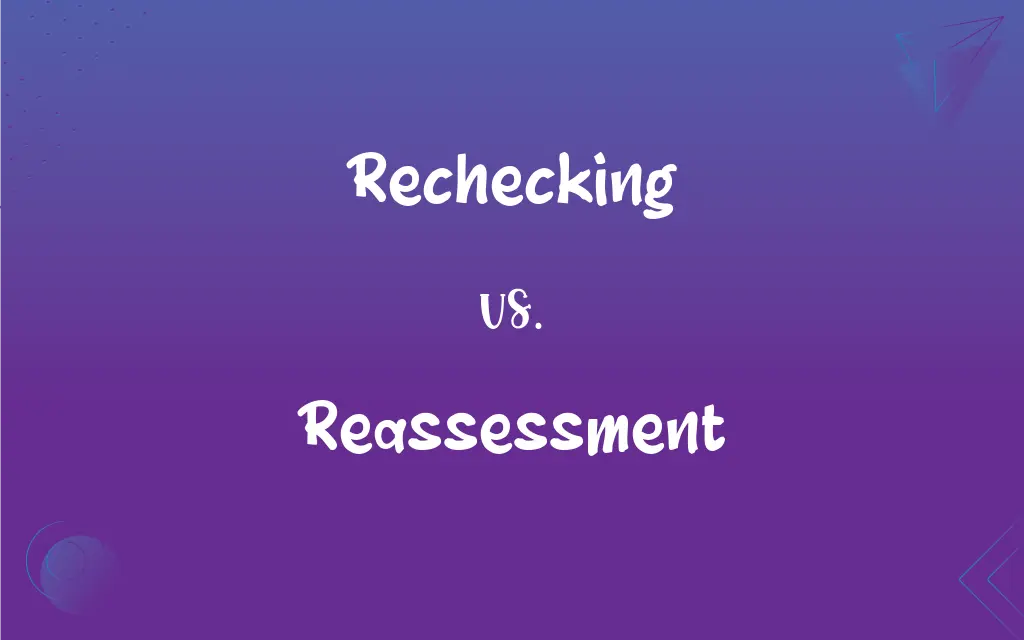Rechecking vs. Reassessment: What's the Difference?
Edited by Harlon Moss || By Janet White || Updated on November 19, 2023
Rechecking refers to verifying accuracy or completeness. Reassessment refers to reevaluating to determine a new value or perspective.

Key Differences
Rechecking involves a detailed review to confirm the accuracy or completeness of something, often focusing on specific details or errors. Reassessment, in contrast, is a broader reevaluation or re-examination of something, generally to form a new understanding or value.
Rechecking is a process that often entails going over previously checked work to ensure no mistakes were made. Reassessment, however, involves a more comprehensive review that may lead to new conclusions or changes in understanding.
In rechecking, the emphasis is typically on accuracy and confirming previously established facts or figures. Reassessment, on the other hand, implies a deeper analysis that could result in a change of perspective or valuation.
Rechecking is usually a quicker process, aimed at verifying the correctness of something. Reassessment is more involved, requiring a reconsideration of the basis or criteria of an evaluation.
Rechecking is often a task performed by the same individual or team who did the original work, focusing on details. Reassessment might involve different individuals or teams and is aimed at reevaluating the broader aspects or principles.
ADVERTISEMENT
Comparison Chart
Focus
Accuracy and correctness of details.
Broader evaluation and new understanding.
Purpose
Confirming previous findings or calculations.
Reevaluating to establish a new perspective.
Scope
Narrow, specific elements.
Wide-ranging, often involving new criteria.
Process Duration
Typically shorter and more focused.
Generally longer and more comprehensive.
Outcome
Validation or correction of details.
Potentially significant changes in evaluation.
ADVERTISEMENT
Rechecking and Reassessment Definitions
Rechecking
A repeat inspection to confirm initial findings.
The technician was rechecking the engine to ensure all issues were resolved.
Reassessment
Re-examining to determine a new value or perspective.
The antique was sent for reassessment after its historical significance was discovered.
Rechecking
Examining something again for accuracy.
The accountant spent the afternoon rechecking the financial reports.
Reassessment
A review that often leads to a change in approach or opinion.
The crisis prompted a reassessment of our emergency procedures.
Rechecking
Reviewing to detect any missed errors or issues.
Before submitting the manuscript, the author was rechecking it for typos.
Reassessment
Evaluating again with a possibility of new conclusions.
The project's failure led to a reassessment of our strategies.
Rechecking
Cross-verifying data or information.
He was rechecking the inventory list against the stock in the warehouse.
Reassessment
Reconsidering the importance or relevance of something.
The policy changes necessitated a reassessment of our business model.
Rechecking
Verifying the correctness of completed work.
After finishing the exam, she spent a few minutes rechecking her answers.
Reassessment
A fresh analysis to update or change previous understanding.
His performance led to a reassessment of his role in the team.
Rechecking
Infl of recheck
Reassessment
The act of reassessing; a second or subsequent assessment.
Rechecking
A second or subsequent checking; reverification.
Reassessment
A renewed or second assessment.
Reassessment
A new appraisal or evaluation
FAQs
Is "rechecking" the same as "double-checking"?
Essentially, yes, though "double-checking" implies a second review for certainty, while "rechecking" may occur multiple times.
What does "rechecking" mean?
Rechecking refers to the process of examining or reviewing something again to ensure accuracy or completeness.
Can "rechecking" change the outcome?
Yes, rechecking can lead to different outcomes if errors are found and corrected.
When is rechecking commonly used?
It's often used in contexts like exams, data verification, or quality control.
Is "rechecking" a formal term?
Yes, it's a formal term used in professional and academic settings.
Is "reassessment" a formal process?
Yes, it usually refers to a formal, structured process.
Can "reassessment" affect decisions?
Absolutely, as it may lead to new conclusions or actions based on revised evaluations.
Why is rechecking important?
It's crucial for ensuring accuracy and reliability in any process.
Does "rechecking" imply error?
Not necessarily; it's often a precautionary measure.
How do you use "rechecking" in a sentence?
"The accountant is rechecking the financial reports for any discrepancies."
Is "reassessment" only used in business contexts?
No, it's used in various contexts, including personal and academic settings.
Can "rechecking" be automated?
Yes, in many fields like data analysis, rechecking can be automated.
What does "reassessment" mean?
Reassessment is the act of evaluating something again, often to see if there has been a change in value or status.
Is "reassessment" similar to "revaluation"?
Yes, both involve a reevaluation, but "revaluation" is more specific to determining monetary value.
Can "reassessment" lead to policy changes?
Yes, especially in governmental or organizational contexts.
Why is reassessment necessary?
It ensures decisions remain relevant and accurate over time.
Does "reassessment" always lead to change?
Not always; it may confirm the current status or understanding.
Is "rechecking" a noun or a verb?
It's a gerund, which acts as a noun derived from a verb.
How is "reassessment" used in a sentence?
"The committee is conducting a reassessment of the project’s feasibility."
When is reassessment typically used?
It's commonly used in finance, education, and property valuation.
About Author
Written by
Janet WhiteJanet White has been an esteemed writer and blogger for Difference Wiki. Holding a Master's degree in Science and Medical Journalism from the prestigious Boston University, she has consistently demonstrated her expertise and passion for her field. When she's not immersed in her work, Janet relishes her time exercising, delving into a good book, and cherishing moments with friends and family.
Edited by
Harlon MossHarlon is a seasoned quality moderator and accomplished content writer for Difference Wiki. An alumnus of the prestigious University of California, he earned his degree in Computer Science. Leveraging his academic background, Harlon brings a meticulous and informed perspective to his work, ensuring content accuracy and excellence.
































































